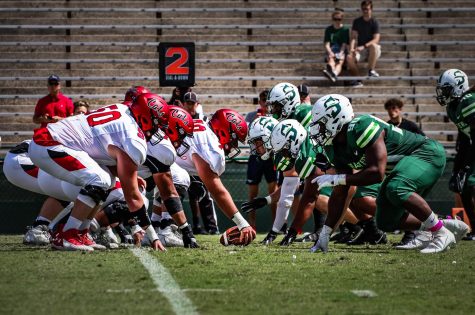Diversity, Inclusion, and Controversy in Marvel-Disney’s historic Shang-Chi film
Disney and its superpower branch, the Marvel Cinematic Universe, has been dominating the big screen since the 2008 release of “Iron Man.” This kicked off the MCU’s rise in cinema over the past decade and a half, reaching all across America and the world. Over the years, we have seen Marvel Comics turn into mega-franchise films such as the installments of the Avengers, Thor, Iron Man, and Spider-Man. Also included are the historic all-Black lead cast of “Black Panther,” female-led films of “Captain Marvel” and “Black Widow,” and most recently the all-Asian lead cast of “Shang-Chi and the Legend of the Ten Rings.”
The Marvel Cinematic Universe has been and still is predominantly led by white male actors taking on the role of a superhero while people of color have been left to the side, playing the supporting roles. This is notable in almost every MCU film with characters such as Rhodey/War Machine (Terrence Howard/Don Cheadle, “Iron Man”), Falcon (Anthony Mackie, “Captain America: The Winter Soldier”), and Ned Leeds (Jacob Batalon, “Spider-Man: Homecoming”).
It wasn’t until the 2018 release of “Black Panther” (Chadwick Boseman) when we finally saw an all-Black leading cast as the heroic and innovative protagonists and antagonists. The movie opened the door more for people of color, leading a path of diversity and inclusion in the MCU and holding the film industry accountable in representing the world of today.
In 2019, Phase Four of the MCU was announced, and the stories and casts have been the most diverse in MCU history. The latest film release of Phase Four, “Shang-Chi and the Legend of the Ten Rings,” has made a monumental and historic mark in the entertainment industry as the first superhero film with an Asian-led cast. Shang-Chi is about Shaun (Shang-Chi), the heir of his immortal father’s Ten Rings organization, who ran away to San Fransisco to build a life of his own, leaving behind his little sister, Xialing.
After a decade passes, Shang-Chi’s father, Xu Wenwu, hears the voice of his deceased wife, Ying Li, and sends his men to search for his children to help him save her. What begins as a forced family reunion turns into a reignited revolt against Xu Wenwu by his children, leaving Shang-Chi and Xialing to find their maternal relatives, the people of Ta Lo, to warn and defend them against the war their father is bringing to their family’s ancestral, sacred land.
The day after the first theatrical release of Shang-Chi, I hopped in my car and drove 25 minutes away from campus to see the film at the Hollywood Theatre. Throughout the course of watching Shang-Chi on the big screen, I was deeply in awe. The vibrancy of the cinematography, costume designs, discussion of family matters, and stellar acting performances were nuanced and sublime. Since it was Labor Day weekend, there were about 12 people in the theatre I was in. When the main credits started rolling, half of the audience walked out and missed the post-credit scene. Once the scene ended, the rest of the audience, except for one guy, left.
This was a mistake—everyone who is a true Marvel fan knows that Marvel tends to add multiple post-credit scenes after the production company logos and thank yous, so I stayed until the end. Sure enough, there was another post-credit scene that was empowering and badass, showing the fall of patriarchy and the rise of the matriarchy. If you decide to go see “Shang-Chi and the Legend of the Ten Rings,” make sure to stay until the theatre lights come back on.
While Shang-Chi is a historic moment in cinema, its recognition, press tour, and marketing have been overlooked and downgraded. As a Marvel fan and lover of films, I keep up with release dates, casting of films/series, directors, and much. When I would go and make the rounds on my social media accounts, I hardly saw any significant marketing of Shang-Chi.
With films such as “Black Widow” or the Disney+ series “The Falcon and the Winter Soldier,” “Loki,” and “WandaVision”, I would see ads pop up on social media, particularly Facebook and Instagram, but it was rare that I would see something for Shang-Chi. I thought it could have been my algorithm, but I see Marvel and Disney posts frequently. I went to the internet and sure enough, other people were noticing the same thing.
The marketing of Shang-Chi has been subpar, and given that it is the first MCU superhero film with an Asian-led cast, one may assume it is related to negative racial connotations. On Aug. 12, 2021, Chief Executive Officer of Disney, Bob Chapek, recently made a striking comment during an earnings call, reporting financial outcomes on Disney’s third quarter for the 2021 fiscal year. During the earnings call, Chapek discussed the theatrical release of Shang-Chi and the post-45 days until the film’s Disney+ release, calling it an “interesting experiment.”
Many fans across the world, including myself, were taken aback and thought Chapek’s comment was demeaning. Even the lead actor of Shang-Chi, Simu Liu, took to social media to respond to Chapek’s comment. Liu stated, “We are not an experiment. We are the underdog; the underestimated. We are the ceiling-breakers. We are the celebration of culture and joy that will persevere after an embattled year. We are the surprise. I’m fired the f*** up to make history on September 3rd; JOIN US.” The connotation of Chapek’s “experiment” comment made it seem as if Shang-Chi was just a test to see how well their first Asian-led cast would do during a global pandemic, on labor day weekend, and being a theatrical to Disney+ release.
To get insight and perspective, I met with Stetson’s Asian Pacific American Coalition executive members, Anh Nguyen ‘22 (President of APAC), Francis Alexa Morales-Diaz ‘22 (Director of Communications), Claire Sigl ‘23 (Director of Events), and Michael Nguyen ‘23 (Director of Marketing and PR) to discuss some of the controversies and expectations of Shang-Chi. Compared to Shang-Chi’s counterparts such as “WandaVision,” “The Falcon and the Winter Soldier,” and “Black Widow,” MCU fans have noticed a lack of marketing, and whether it is intentional or not is unknown.
“When I found out it came out, I didn’t even realize it’d come out until like, I was actually surprised. I thought it was going to come out much later,” APAC’s Sigl said.
Sigl thought the lack of marketing for Shang-Chi could be attributed to Disney prioritizing its marketing on “all the things that are available on Disney+.” She began to acknowledge the attention of Shang-Chi but instead, she diverted from her starting statement, sighed, and stated, “it’s just kind of disappointing, at least I can say.”
Contrary to Sigl, APAC’s Director of Communications, Morales-Diaz, saw “a whole bunch of marketing that they were doing” but prior to Shang-Chi’s Sept. 3 theatrical release, “There wasn’t really a lot of marketing.” She mentioned that “The confusion with the release date” stems from the multiple release date changes and that Shang-Chi was said to have been “A series, not a movie… all of a sudden, about two months ago, they said it was coming out in September and it was going to be a movie.”
Morales-Diaz also shared with us that in an article she had read, it discussed that “In China, they did a lot more advertising than here.” Putting things into perspective and giving pointers for Disney, she believes “The U.S. kind of lacked in the marketing, advertising department with Shang-Chi. They could have done a whole bunch more to promote the movie and to really get the name and the word out there.”
At the center of the controversies surrounding Shang-Chi was Chapek’s “interesting experiment” comment about the release structure of the new film. “Just that statement, kind of makes me feel like movies featuring Asian superheroes aren’t pushed more or they don’t really think it’s such a big deal… I think it’s a poor phrasing of words and kind of makes it seem like Asian representation and these big blockbuster superhero movies are not worth it to these companies. Maybe he just didn’t mean it that way, but at the same time, that’s what it kind of implies,” Sigl stated when asked how Chapek’s poor choice of wording made some of the APAC executive board members feel.
Although Chapek’s comment is met with negative criticism, “when he meant experiment, he meant the release format of the movie because previously “Black Widow” was released and it was released on Disney+ and movie theaters,” commented Michael Nguyen.
“The terminology kind of feels like they mostly care about their own self-interests, but because they really only care more about money than actually like giving out this masterpiece with a bunch of Asian-led actors. That’s how I see it,” he added.
“It’s very disheartening because we’re all here assuming what you would have thought what did that word experiment mean? But, thinking back, this isn’t the first time they experiment, to use his words, with an Asian film because they also had “Mulan” this year when he was also CEO of Disney. But it’s also just very heart wrenching because I want to work for a company like that. Just to hear the CEO say things like that when I’m also Asian is kind of a double-edged sword. In a way, I just wish that he would have thought about his words a little clearer and understood how much value and culture there is in this movie compared to the other movies that they’re also releasing. If we go into “Black Panther,” there’s a whole bunch of culture there, if you go into “Beauty and the Beast,” there’s a whole regimen that’s behind that. So yeah, it’s just very, very heart wrenching,” Morales-Diaz added.
Since “Shang-Chi and the Legend of the Ten Rings” was released during Labor Day weekend, which is known to be the weakest week for cinemas across the country, and the fact that Disney was trying out a new release format (theatrical then Disney+ release), I wondered if Disney should have done something different so it wouldn’t seem as if they’re trying new things on a movie with such grand significance.
Anh Nguyen, President of APAC, commented, “I think they have all the resources and in a way, they know what to do and they know when to release it. Maybe it’s a marketing strategy, I am not sure, maybe it’s just to say, I’m gonna catch up with this train about releasing more diversity… I’m just going to do whatever to bring it out but I don’t really care how much it’s gonna bring to me.”
Nguyen also mentioned that for a film, “Taking more diversity and different culture tests on it, I don’t think that they understand it, or maybe they just, you know, stay at the headquarters and think about what they want to do with the rest of the world, but they don’t really go out and experiment that to see why it is important for certain people or why is it important to release this. They just want to do it just to do it.”
Stetson’s Asian Pacific American Coalition has yet to see “Shang-Chi and the Legend of the Ten Rings.” Naturally, my final question to them was what they hoped and expected to see in Shang-Chi—stereotypes or refinement of stereotypes. Morales-Diaz told us, “I know that stereotypes is really hard to just avoid in some way because no matter how hard we try to like do the research and really go for some of the history, there’s still gonna be some type of stereotype. I do hope that there is a refinement like you were saying, and I hope that the culture and maybe some of the history of martial arts is shown in the movie because that’s a very big part of our culture, and also, maybe just other things you find in the culture that are very enriching. I just hope they do a good job with that.”
As for Nguyen, she hopes “They are not going to, I would say, exploiting the culture to kind of push everything into one movie and say, ‘Oh this is the culture’… you should have done it beautifully in a way that people see and they appreciate it rather than you’ve just mushed everything in one movie for two hours. I expect to have more, you bring what you know, rather than you just try to put it in to make it more kosher, I guess.”
In light of seeing “Shang-Chi and the Legend of the Ten Rings,” learning about the controversies that have surrounded the film, and speaking with the Asian Pacific American Coalition, I think that films such as Shang-Chi are changing the future of the film industry and should be revered and celebrated for their artistry and representation of the Asian community. In the context of Simu Liu’s comment on social media, Shang-Chi is a “ceiling-breaker.” Although I may not have worked on any aspect of the film, I think the goal, to any MCU fan and anyone who understands what’s like to be from an underrepresented community as I do, is clear: to bring a Marvel comic to life and represent the East Asian community and their culture in a positive and heroic light, redefining Asian roles and creating a new path of diversity and inclusion for the future artists of the film industry.









